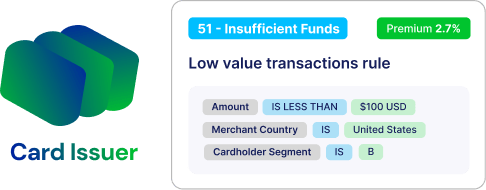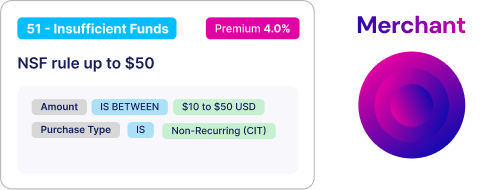The Platform
Innovative technology
for Issuer-Merchant collaboration
Kipp bridges the gap between issuers and merchants to unlock revenue and reduce card declined transactions.
Example: Insufficient Funds (NSF) Declines
An issuer sets the rules
and ‘Ask’ price
An issuer creates customized rules to determine which transactions it’s willing to approve using a range of parameters.
Rules are based on factors like:
- Cardholder segment: credit score or affordability score.
- Over-limit amounts: How far over the limit the cardholder is.
- Merchant Category Code (MCC): The type of merchant involved.
- Any other parameter: An issuer can use any other data point
related to the transaction or cardholder.
An issuer sets an ‘Ask’ price e.g. Premium 2.7%
(a percentage premium fee) it requires the merchants to pay it for approving these transactions.


A merchant sets their
‘Bid’ price
That’s it- no API integration or sharing of sensitive data is required to avoid NSF declines!
- Shares Merchant IDs (MIDs) to identify transactions.
- Sets their Bid Price: The percentage of transaction value they are willing to pay to avoid a decline.
A merchant defines their ‘Bid’ price e.g. Premium 4.0% the percentage premium it’s willing to pay to avoid declined transactions.
Real-time collaboration
Here is how Kipp connects issuers and merchants in real-time:
- Transaction Decline Trigger:
A customer or merchant initiates a payment.
The issuer assesses the transaction and determines it would normally be declined due to insufficient funds or credit limit exceeded. - Issuer Contacts Kipp:
The issuer sends a secure API call to Kipp to check if the merchant is enrolled and their ‘Bid’ price matches the issuer’s ‘Ask’ price. - Kipp Merchant Check:
If the merchant is enrolled with Kipp and their ‘Bid’ price meets or exceeds the issuer’s ‘Ask’ price, Kipp facilitates the approval.
- Transaction Approved:
The issuer authorizes the payment, the merchant avoids a lost sale, and the customer enjoys a seamless checkout experience.


